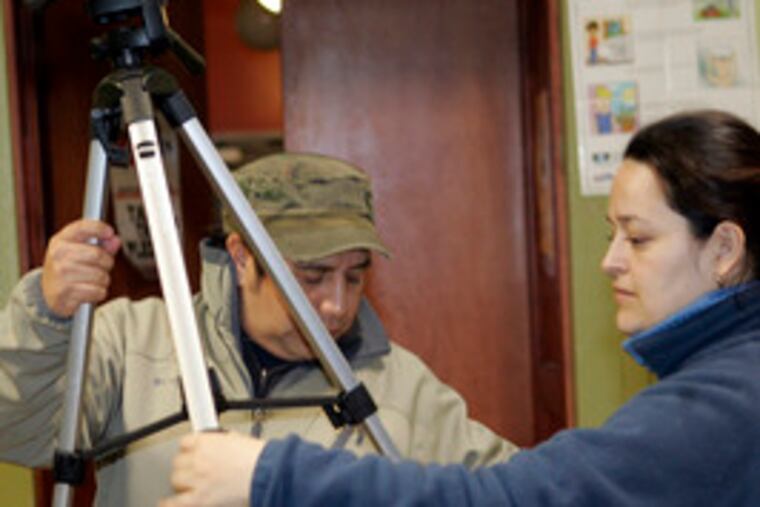Video project for Latino immigrants
Manuel Solares is a 16-year-old who works six days a week in a Philadelphia grocery store to help his family in Mexico.

Manuel Solares is a 16-year-old who works six days a week in a Philadelphia grocery store to help his family in Mexico.
He doesn't speak English, but he has something to say - and he wants to express himself through a video-training program for Latino immigrants that started last month in South Philadelphia.
Solares "wanted to make sure that he was able to help his people, help undocumented immigrants in this country, [to] basically have a voice," said Peter L. Bloom, translating for the teen, who is himself undocumented.
Bloom is executive director of Juntos, a Latino community group that has joined forces with the Media Mobilizing Project to launch Our City, Our Voices: Immigrant Newscasts in the Digital Age.
The videos, organizers say, will "illustrate the challenges and hopes of leaving your home and living in a place that does not know your history."
The effort was funded this year by a $150,000 grant from the Knight Foundation 21st Century News Challenge, which supports technology-based innovations in community news.
The videos made by Our City, Our Voices will focus on immigrant life and issues such as housing, education and workers' rights.
"Our hope, ultimately, is to have the communities who are talking about these issues merge and start to talk to each other across Spanish-speaking communities, English-speaking communities, and across issues," said Todd Wolfson, a cofounder of the Media Mobilizing Project.
"It is very important for our communities, not only in Philadelphia but in all the United States, that we can be together and we can work together, because it is very important to understand each other," said Sylvia Aviles, 54, a project participant who took a bus each week from her home in Reading to attend classes.
The Spanish-language workshops began last month at the Houston Community Center at Eighth Street and Snyder Avenue and concluded with a graduation ceremony last week.
Twenty participants completed the training and are planning their videos.
"The next step is that these folks go out and make their own videos of issues they feel are important," said Gabriel Berrios, project coordinator for Juntos, which means "together" in Spanish.
Berrios said he expected six short documentaries to be made by the participants, who will work in teams with each member handling specific responsibilities such as camera recording, sound and editing.
The completed videos will be distributed on a program Web site, through public screenings, and on the Internet through venues such as YouTube, said Wolfson, a doctoral student of anthropology at the University of Pennsylvania.
There will be more workshops in February intended for a broader group of immigrants, including taxi drivers, Wolfson said. Those classes will be conducted in English.
The Latino participants so far range from Solares the teen to Aviles the retired Spanish translator and also include carpenters, cooks, laborers and nannies.
Solares came here in March from a town south of Mexico City. Like many others who come here to work, he barely has time beyond his job. But he learned about the program and was intrigued.
He said he wants to make a mini-documentary about young Mexican immigrants who want to go to college but cannot because of their illegal residency or lack of money.
Some undocumented children grow up here and attend public school, he pointed out. "Those kids are able to go to school, but only to a certain point," he said in Spanish.
Once they graduate, often all they have to do is find a job, he said.
"In order for our community to go forward, we really need to be able to study," he said.
True to his own words, Solares last week began studying English.
To see a video from the "Our City, Our Voices" project, go to